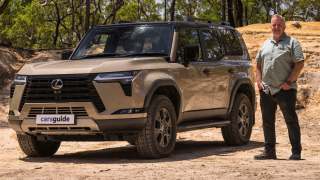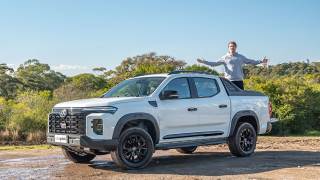Nissan says the Patrol will skip the e-POWER step and jump to full electrification, but only when solid state battery technology is available, which seemingly locks in petrol power for the Y63.
Speaking at a recent Australia media event, Nissan's most senior executive for the region - Guillaume Cartier, Chairperson of Management Committee for AMIEO - said part-electrification would prove too heavy, and too expensive, for a vehicle the size of the Patrol, which would still need to pair an ICE engine with sizeable on-board battery.
"(The Patrol) is more linked, this type of car, more linked to the solid-state battery technology," Cartier said.
Read more about the Nissan Patrol
"The heavier your car, the more difficult it is to electrify...because if you have a car that you want to keep the capability, if it's a car which is more than two tonnes, the battery you need to have is making it heavier and more expensive.
"So if you say, 'yeah, you can have it electrified, but the surcharge is $10,000', you may lose some of them.
"So the key things is to say, 'okay, can I make sure I electrify, but I'm still cost competitive for the the owner?' That's why the answer of the solid-state battery is a good one."
Asked directly whether that means the Nissan Patrol will skip the 'electrification' step and instead move to full battery-electric once solid state battery technology arrives, Cartier replied: "Your thinking is the right one."
"To make it simple, beyond that there are different possibilities... when I know, I will tell you. But your thinking is the right one. You have solid-state battery, which is one, but you can have some alternatives."
Nissan says solid-state battery technology will improve efficiency, and thus reduce cost by 40 percent. In real terms, that means the battery required to travel 1000kms will be 40 percent smaller than it is today.
But with that technology not set to arrive at Nissan until "2026, 2027", it raises the question of what is to be done with the Patrol in the meantime.
Cartier's view ties nearly with CarsGuide's news from the New York Auto Show, where Nissan America Corporate Vice President, Michael Colleran, told us that a new Armada - the US version of the Patrol - is coming in the "not-too-distant future" and will feature a "technology-forward powertrain", which doesn't sound like a V8.
"Armada will remain an important part of our portfolio into the future, and there are scheduled updates and a full major change for the vehicle in the not-too-distant future," he said.
"Clearly the world landscape, and in the US as well, that landscape is shifting towards EVs. But that doesn't mean that internal combustion doesn't have a very important role to play.
"Do we see powerful V6s and other internal combustion engines being a part of our future? Absolutely."
Reports out of both the Middle East and the USA — both quoting Nissan sources — suggest the Y63 will say goodbye to its 298kW/560Nm petrol V8, and instead swap to a twin-turbo V6. That engine will reportedly pair with a new nine-speed torque-converter automatic transmission and a permanent all-wheel-drive system.
That said, the brand will no doubt seek to match the current V8 on power, and beat it on efficiency, despite the fewer cylinders. The Nissan Z delivers 298kW and 475Nm from its twin-turbo six-cylinder engine, for example, but it's unclear whether the Patrol's powertrain will be new to Nissan, or a tweaked version of an existing engine.
Of course, it's also possible the Patrol will retain its V8 engine until workable solid-state battery technology arrives towards the end of the decade, but that would make it an old vehicle indeed.















Comments